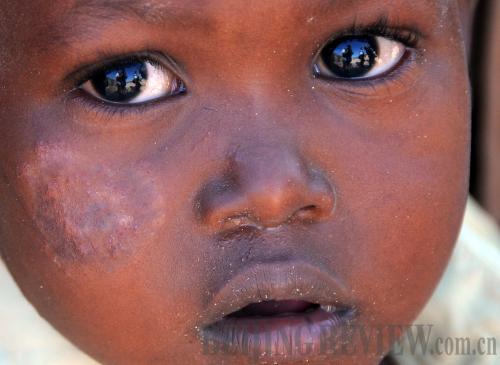|
 |
|
TRAGEDY: eyes of hope (XINHUA) |
Way ahead
This has proved valid given the increase in support and personnel the AU has committed to the transitional authorities in Mogadishu. In response to the 2010 bombings in Kampala, the AU approved a further 2,000 troops be sent to Mogadishu to assist in peacekeeping activities. What progress the coalition government has made has been hard won, but political foundations are being built on.
Work is underway to rebuild state institutions, reconstruct the Central Bank and two successive (if democratically flawed) elections have been held under close public and international scrutiny. The government has also begun to attempt reconnecting Somalia to international forums and sources of assistance. A $2 million deal was struck with the African Development Bank to assist in reconstruction, while a series of trade deals were arrived at with China in 2007, although no direct progress has been reported on these given the instability that followed.
Allegations of corruption and elitism in the transitional governance structures abound, and international criticism of the fledgling regime is bookended by respective Islamist groups' attempts to topple the regime. In the north of the region, two autonomous bodies- Somaliland and Puntland - are calling ever more insistently for international recognition and support for their attempts to officially secede- moves which strike a body blow to any Somali unity the Federal government and its Islamist coalition partners are trying to reinforce. Somaliland officially declared its secession from Somalia, and constructed a separate administration after the fall of the Siad Barre regime.
As mentioned above in the case of Somalia, international recognition would likewise bring entrance to multilateral organizations, the chance to recruit assistance and the opportunity to attract foreign direct investment. As such, Somaliland conducts limited trade with the nearby Gulf States, and its government survives on remittances from this.
The transitional government in Mogadishu is resistant to secession, likewise to the movement to secede in the Puntland region on the very tip of Africa's horn, as these are a direct blow to any semblance of unity it is trying to instill in Somalis given their fractious experience of governance until now. Internationally, the AU is resistant to secession given some in its leadership fear a precedent that could fragment the continent even further and even delay the ideal of continental unity.
As it passes its 50th year of statehood, Somalia may seem to deserve little more than its international reputation of a failed state. While the northern regions of Somaliland and Puntland are admittedly further along the line toward resolving bad governance issues than the conflict-ridden south, the chance for change in Somalia seems dim, but burn still.
Matthew McDonald is a research analyst at the Center for Chinese Studies, Stellenbosch University, South Africa |